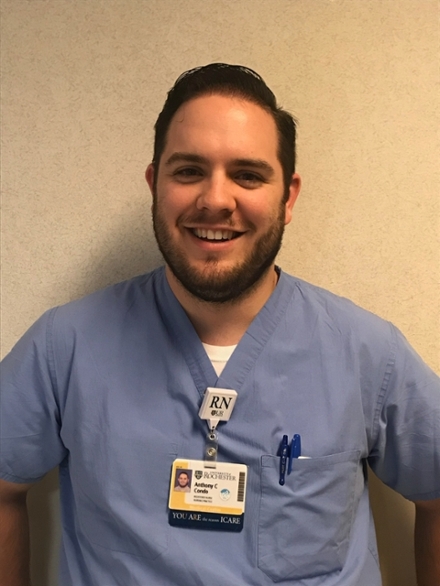‘We’re all trying to do our part’
By Anthony Condo, BS, RN, CCRN
Tuesday, May 5, 2020
About a year and a half ago, I met the managers of a newly formed infectious disease response team at Strong Memorial Hospital. At the time, the major concern was how to deal with a potential outbreak of the Ebola virus. I am typically a critical care nurse on 8-3400 and also do some work with the mobile stroke unit, so I volunteered to be part of the small team, which has since expanded greatly and become our COVID-19 response team.
As more people in our community have tested positive for the virus, the role of our team members has shifted from part-time contribution to full-time staffing on our Highly Infectious Disease Units (HIDU). But even as the crisis has intensified, we’ve had plenty of nurses willing to take care of COVID patients. Our HIDUs are still being staffed completely on an all-volunteer basis. No one has been conscripted to come and help us, and none of us is being mandated overtime. It’s almost like a civic duty. We’re all trying to do our part. If we don’t do it, who will?
There are definitely days where it is stressful and extremely challenging. With COVID, there are times patients go from zero to 100 in a blink of an eye – from walking and talking to where we’ve maxed out what we can do for them medically in a very short amount of time. They might come in talking normally and within a half hour they’re on a breathing machine and been chemically sedated.
 On top of the speed with which this virus debilitates patients, it also leaves them isolated. Because the virus is so contagious, patients can’t have their families in with them, even when they’re seriously sick. Patients are often alone in their room with just the sounds of their breathing machine or some music. As nurses, we have to spend most of our time away from them, too, to lessen our chances of exposure and make efficient use of our PPE. That doesn’t make us feel good since that’s not what our community expects from us and it’s not why many of us got into nursing in the first place.
On top of the speed with which this virus debilitates patients, it also leaves them isolated. Because the virus is so contagious, patients can’t have their families in with them, even when they’re seriously sick. Patients are often alone in their room with just the sounds of their breathing machine or some music. As nurses, we have to spend most of our time away from them, too, to lessen our chances of exposure and make efficient use of our PPE. That doesn’t make us feel good since that’s not what our community expects from us and it’s not why many of us got into nursing in the first place.
But like everyone, we are coping. We are adapting to new ways of doing things and taking advantage of opportunities to learn from each other. Our new teams have members from all corners of the hospital and that has allowed us to see how other nurses in other specialties do things. We all have different strengths and things that we do better than others, and there has been a lot of educating each other as we go along. We’re also learning more about ourselves. In crises like this, nurses have to know their own limits, know how to minimize risks, and be true to themselves.
As nurses, we have highly trained skills. It would be a disservice to these patients who are 100 percent completely reliant on you not to use them to their fullest extent. In some ways, this is no different that dealing with any other patients – they all rely on us to get better. It’s just that these patients are highly contagious. Our nurses recognize that they can do their part to get this whole thing over with. And the sooner we can do that, the sooner we can get back to normal.
Anthony Condo, BS, RN, CCRN, is a staff nurse at Strong Memorial Hospital and an alumnus of the UR School of Nursing. This article originally appeared in the Democrat & Chronicle's Salute to Nurses.

